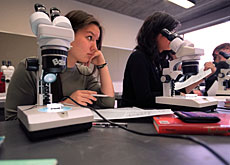Bologna reforms still have a long way to go

Swiss university studies are too restrictive and rigid, hampering mobility rather than encouraging it, says a student survey.
On Thursday the Union of Students in Switzerland, the Rectors’ Conference of Swiss Universities and sociologists from Geneva University presented the results of a poll carried out in March among 4,690 university students about study conditions in Switzerland under the new Bologna system.
Although 80 per cent of students say they are happy with their studies, a great deal of work is still needed to properly implement the new Bologna reforms aimed at harmonising degrees across Europe and encouraging mobility.
The Bologna educational reforms are part of the European Union’s 1999 Bologna Declaration, which Switzerland has signed together with 45 other countries.
Under the new system, the first university degree, a Bachelor’s, can be awarded after three years, followed by a Master’s after a further two years. This replaces the old Swiss system of degrees and diplomas.
The idea behind Bologna is to harmonise qualifications across Europe, so that students and staff can move freely between universities, and the degrees they hold are recognised in every country.
Nevertheless, when you scratch the surface you discover the real problems, Sarah Gerhard, president of the Union of Students in Switzerland, told swissinfo.
“Study conditions are not perfect in terms of how subjects are organised, mobility is still not really possible…but for me the biggest concern is the European Credit Transfer System (ECTS), which hasn’t been fully and correctly implemented,” she said.
Study abroad? No, thanks
Although 68 per cent of those questioned said the new Bologna system made things easier to study abroad and 52 per cent felt the credit system offered more flexibility and freedom, over 80 per cent said there were very big differences in how credits were attributed depending on the course. And 56 per cent thought the new system did not measure skills correctly.
But in any case, studying abroad is not a priority for many Swiss students: almost half said they were not interested.
Nearly half of these said their lack of interest was because they were afraid of experiencing problems on their return. Around 25 per cent of students who had already studied at foreign universities said they had indeed faced problems in having the credits they earned there recognised in Switzerland.
The other half blamed the “too rigid” system of compulsory lessons, which meant they couldn’t afford time to go abroad.
Even though it wasn’t the main focus of the study, the social
dimension also clearly has an impact on students’ perceptions, said the Swiss student president.
Three-quarters of students whose parents were graduates were happy with their situation, whereas more than half of those whose parents didn’t go to university seem to have difficulties, she said.
“It was shown quite clearly that it’s difficult to study part-time in Switzerland, but about one-third work regularly, averaging 13.4 hours per week… Students who are hard-up indicated they would welcome more time to study instead of having to work to finance their studies,” said Gerhard.
Could do better
Swiss state secretary for education and research, Mauro Dell’Ambrogio, who attended the presentation on Thursday, said on the whole the survey results were positive.
“But there is still room for improving the Bologna reforms,” he told Le Temps newspaper.
In its own 2004-2007 report published on Thursday, the Rectors Conference of Swiss Universities recognised that there was still a long way to go.
“Bologna does not automatically lead to an increase in mobility and can even have the opposite effect,” it admitted.
“With the curriculum now in two stages, the windows of mobility are less frequent,” explained Perre Willa, head of international relations at Geneva University.
“Study credits are not an exact science,” added Lausanne University’s rector, Dominique Arlettaz.
Although the introduction of a “top-down” reform in Switzerland has not been easy, more needs to be done by all sides, said Gerhard.
“Swiss universities have to make an effort to implement ECTS correctly, to make it easier to study part time, to have more counselling services for socially disadvantaged students, but at the same time the cantons and federation have to increase study grants,” she said.
swissinfo, Simon Bradley
The Swiss education system is undergoing a series of major reforms to make it more competitive globally.
Swiss higher education institutions began to implement the Bologna Declaration in 2001/2 by introducing new Bachelor and Master degree courses. The Bologna system is a European-wide harmonised tertiary education format that applies a two-step (Bachelor and Masters) approach.
A referendum in May 2006 passed government proposals to enhance coordination between different cantonal school systems and to give the federal authorities a bigger say in setting the educational agenda in future.
The Bologna Declaration of 1999 aims to create a European Higher Education Area by 2010.
Switzerland is one of 45 countries in Europe that signed up to the accord, whose aim is to harmonise European higher education to make it more attractive internationally.
The new university course is divided into two stages: three years for a Bachelor’s degree and two more to obtain a Master’s degree.
The first Bachelor courses started in 2001. The first degrees were awarded in 2004 (1,057, mainly in law and economy). This year some 85 per cent of new students will be studying under the new system.

In compliance with the JTI standards
More: SWI swissinfo.ch certified by the Journalism Trust Initiative












You can find an overview of ongoing debates with our journalists here . Please join us!
If you want to start a conversation about a topic raised in this article or want to report factual errors, email us at english@swissinfo.ch.